D120804
Xanthurenic acid
96%
Synonym(s):
4,8-Dihydroxyquinaldic acid, 4,8-Dihydroxyquinoline-2-carboxylic acid
Sign Into View Organizational & Contract Pricing
All Photos(1)
About This Item
Empirical Formula (Hill Notation):
C10H7NO4
CAS Number:
Molecular Weight:
205.17
Beilstein/REAXYS Number:
185954
EC Number:
MDL number:
UNSPSC Code:
12352100
PubChem Substance ID:
NACRES:
NA.22
Recommended Products
assay
96%
form
powder
mp
297-298 °C (dec.) (lit.)
SMILES string
OC(=O)c1cc(O)c2cccc(O)c2n1
InChI
1S/C10H7NO4/c12-7-3-1-2-5-8(13)4-6(10(14)15)11-9(5)7/h1-4,12H,(H,11,13)(H,14,15)
InChI key
FBZONXHGGPHHIY-UHFFFAOYSA-N
Looking for similar products? Visit Product Comparison Guide
Application
Xanthurenic acid can be used as a substrate for the synthesis of:
- Silica-gel functionalized xanthurenic acid (4, 8-dihydroxyquinoline-2-carboxylic acid) as an adsorbent for metal ions.
- N, N′-bis-((8-hydroxy-7-quinolinyl)methyl)-1,10-diaza-18-crown-6 ethers as fluorescent sensors of magnesium in living cells via one-pot Mannich reaction.
- Poly-xanthurenic acid (poly-Xa) for biosensing applications.
Storage Class
11 - Combustible Solids
wgk_germany
WGK 3
flash_point_f
Not applicable
flash_point_c
Not applicable
ppe
dust mask type N95 (US), Eyeshields, Gloves
Choose from one of the most recent versions:
Already Own This Product?
Find documentation for the products that you have recently purchased in the Document Library.
Customers Also Viewed
Kyle Jarrod McLean et al.
Scientific reports, 9(1), 13131-13131 (2019-09-13)
Malaria parasites have a complex life cycle that includes specialized stages for transmission between their mosquito and human hosts. These stages are an understudied part of the lifecycle yet targeting them is an essential component of the effort to shrink
Poly-xanthurenic acid modified electrodes: An amperometric sensor for the simultaneous determination of ascorbic and uric acids.
dos Santos Silva F D A, et al.
Sensors and Actuators B, Chemical, 168, 289-296 (2012)
Microwave assisted synthesis of a small library of substituted N, N′-bis ((8-hydroxy-7-quinolinyl) methyl)-1, 10-diaza-18-crown-6 ethers.
Farruggia G, et al.
The Journal of Organic Chemistry, 75(18), 6275-6278 (2010)
Synthesis of silica-gel immobilized xanthurenic acid and its application to the preconcentration/determination of trace metals in natural water samples
Kasahara I, et al.
Bunseki Kagaku, 47(12), 1061-1067 (1998)
Electrochemical determination of ascorbic acid using poly (xanthurenic acid) and multi-walled carbon nanotubes
Lin K-C, et al.
International Journal of Electrochemical Science, 7(12), 12752-12763 (2012)
Our team of scientists has experience in all areas of research including Life Science, Material Science, Chemical Synthesis, Chromatography, Analytical and many others.
Contact Technical Service










